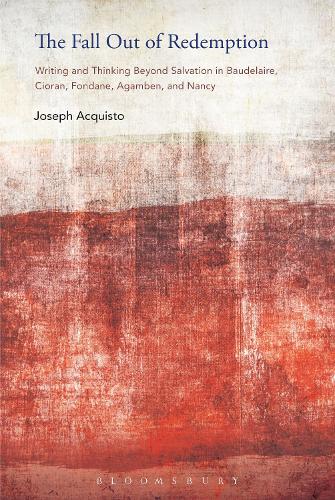
The Fall Out of Redemption: Writing and Thinking Beyond Salvation in Baudelaire, Cioran, Fondane, Agamben, and Nancy
(Paperback)
Available Formats
Publishing Details
The Fall Out of Redemption: Writing and Thinking Beyond Salvation in Baudelaire, Cioran, Fondane, Agamben, and Nancy
By (Author) Professor Joseph Acquisto
Bloomsbury Publishing PLC
Bloomsbury Academic USA
20th October 2016
United States
Classifications
Tertiary Education
Non Fiction
Philosophy of religion
Philosophy: metaphysics and ontology
809.93382
Physical Properties
Paperback
232
Width 152mm, Height 229mm
318g
Description
Joseph Acquisto examines literary writers and critical theorists who employ theological frameworks, but who divorce that framework from questions of belief and thereby remove the doctrine of salvation from their considerations. Acquisto claims that Baudelaire inaugurates a new kind of amodern modernity by canceling the notion of salvation in his writing while also refusing to embrace any of its secular equivalents, such as historical progress or redemption through art. Through a series of interhistorical readings that put literary and critical writers from the last 150 years in dialogue, Acquisto shows how these authors struggle to articulate both the metaphysical and esthetic consequences of attempting to move beyond a logic of salvation. Putting these writers into dialogue with Baudelaire highlights the way both literary and critical approaches attempt to articulate a third option between theism and atheism that also steers clear of political utopianism and Nietzschean estheticism. In the concluding section, Acquisto expands metaphysical and esthetic concerns to account also for the ethics inherent in the refusal of the logic of salvation, an ethics which emerges from, rather than seeking to redeem or cancel, a certain kind of nihilism.
Reviews
Acquisto presents Baudelaires poetry as having been formed both by and against Christianity. Baudelaire is both a modern and a theological. Although Christian tenets are present in his writing, he views the redemption as impossible. This rejection of a traditional aspect of Christian philosophy, Acquisto argues, demonstrates Baudelaires acceptance of a productive nihilism in which a shared human experience is possible without redemption This is a challenging, thoughtful work, and Acquisto makes a convincing case for the shared experience of these authors outside faith and linear time. Summing Up: Highly recommended. Upper-division undergraduates through faculty. -- F. E. Nicholson, North Central College * CHOICE *
This is a powerful, complex, and fascinating book ... Acquisto is mentally agile and writes consistently and with clarity about thinkers who are themselves less engaging and rarely as clear. The great success of the book is the way in which he makes a range of very different voices speak across the centuries and the decades in a dialogical feast of commentary and counter-commentary. * French Studies *
Joseph Acquisto is a leader in the new generation of interpreters for whom poetry and philosophy, together, provide foundational ethical and religious insights both beyond and against traditional theology or faith. Baudelaires recognition of impossible redemption is the germinal insight. Surpassing Walter Benjamins doxa of modernity and Paul de Mans deconstruction, Acquisto lucidly applies Benjamin Fondanes interpretation of Baudelaires abyss and post-theological reflections of Giorgio Agamben, Jean-Luc Nancy, and others, to map out positive meaning that can be achieved by facing despair, beyond nihilism, as exemplified by Emil Cioran. Acquisto provides compelling insights into esthetics and ethics, despair and transcendence, nihilism and survival. Original and truly interdisciplinary. * Edward K. Kaplan, Kevy and Hortense Kaiserman Professor in the Humanities, Brandeis University, USA, and author of Baudelaires Prose Poems: The Esthetic, the Ethical, and the Religious in "The Parisian Prowler" and Spiritual Radical: Abraham Joshua Heschel in America, 1940-1973 *
Author Bio
Joseph Acquisto is Professor of French at the University of Vermont, USA. He is the author of Crusoes and Other Castaways in Modern French Literature (2012) and French Symbolist Poetry and the Idea of Music (2006) and the editor of Thinking Poetry: Philosophical Approaches to Nineteenth-Century French Poetry (2013).
